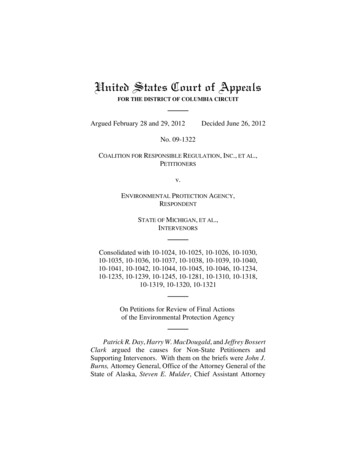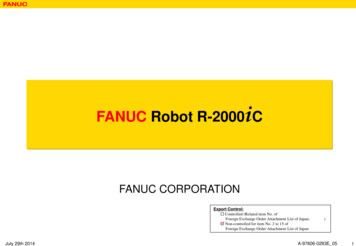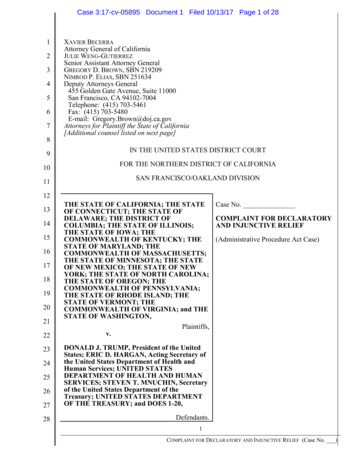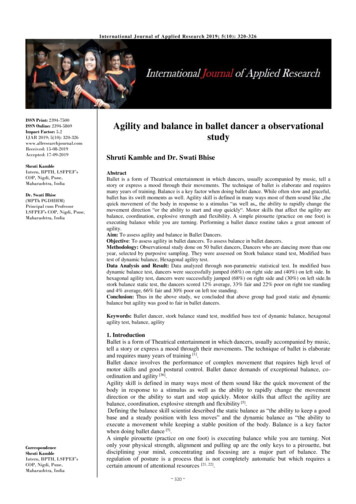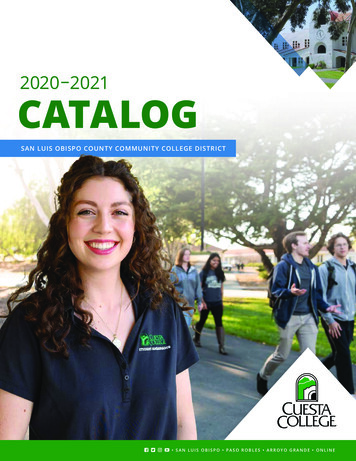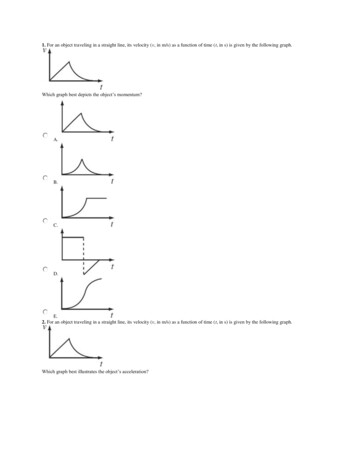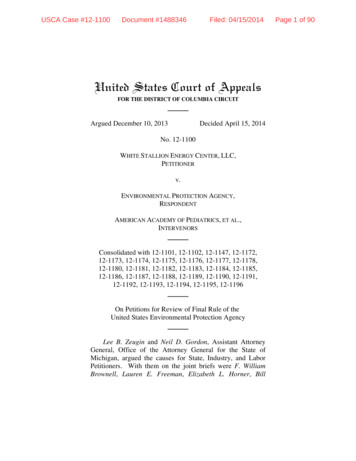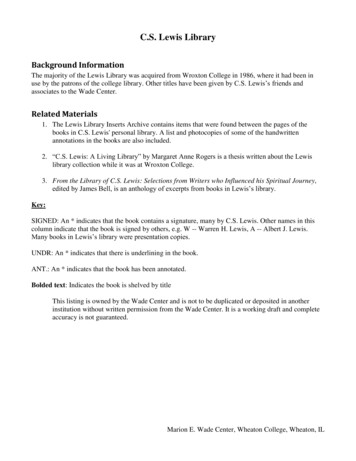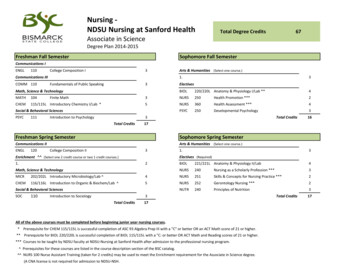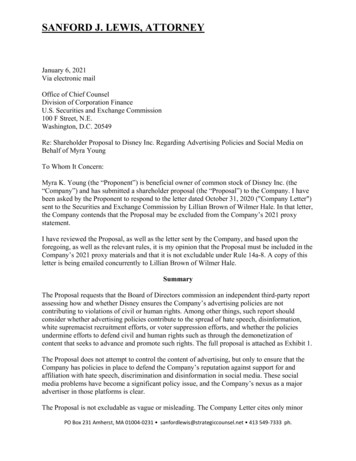
Transcription
SANFORD J. LEWIS, ATTORNEYJanuary 6, 2021Via electronic mailOffice of Chief CounselDivision of Corporation FinanceU.S. Securities and Exchange Commission100 F Street, N.E.Washington, D.C. 20549Re: Shareholder Proposal to Disney Inc. Regarding Advertising Policies and Social Media onBehalf of Myra YoungTo Whom It Concern:Myra K. Young (the “Proponent”) is beneficial owner of common stock of Disney Inc. (the“Company”) and has submitted a shareholder proposal (the “Proposal”) to the Company. I havebeen asked by the Proponent to respond to the letter dated October 31, 2020 ("Company Letter")sent to the Securities and Exchange Commission by Lillian Brown of Wilmer Hale. In that letter,the Company contends that the Proposal may be excluded from the Company’s 2021 proxystatement.I have reviewed the Proposal, as well as the letter sent by the Company, and based upon theforegoing, as well as the relevant rules, it is my opinion that the Proposal must be included in theCompany’s 2021 proxy materials and that it is not excludable under Rule 14a-8. A copy of thisletter is being emailed concurrently to Lillian Brown of Wilmer Hale.SummaryThe Proposal requests that the Board of Directors commission an independent third-party reportassessing how and whether Disney ensures the Company’s advertising policies are notcontributing to violations of civil or human rights. Among other things, such report shouldconsider whether advertising policies contribute to the spread of hate speech, disinformation,white supremacist recruitment efforts, or voter suppression efforts, and whether the policiesundermine efforts to defend civil and human rights such as through the demonetization ofcontent that seeks to advance and promote such rights. The full proposal is attached as Exhibit 1.The Proposal does not attempt to control the content of advertising, but only to ensure that theCompany has policies in place to defend the Company’s reputation against support for andaffiliation with hate speech, discrimination and disinformation in social media. These socialmedia problems have become a significant policy issue, and the Company’s nexus as a majoradvertiser in those platforms is clear.The Proposal is not excludable as vague or misleading. The Company Letter cites only minorPO Box 231 Amherst, MA 01004-0231 sanfordlewis@strategiccounsel.net 413 549-7333 ph.
Office of Chief CounselJanuary 6, 2021Page 2 of 12issues - an article partially behind a pay-wall, and problematic URL link on the Disney website.The URL link is easily corrected; the article behind the pay-wall does not demonstrate that theProposal contains a misleading presentation of facts.ANALYSIS1. The Proposal is not excludable under Rule 14a-8(i)(7). The Company’s policiesregarding placement of advertising on social media platforms transcend ordinary businessconcerns due to the potential threat of these practices to Disney’s overall business.The subject matter of the Proposal is an investor effort to guide the Company to protect itsreputation by ensuring that its advertising policies are not leading to the spread of hate speechand misinformation online. While the content of advertising is historically a matter of ordinarybusiness, shareholders are concerned that the placement of advertising on social media platformspromoting hate speech, discrimination and disinformation go beyond ordinary business due tothe threat of these implications to the Company’s overall business.Notably, the focus of the Proposal does not concern the content of the Company’sadvertisements, but the impact of advertising placement policies on the Company’s reputation asa whole.The evidence outlined below describes the academic and industry research, news commentary,and public attention surrounding the concerns with social media advertising, which, taken as awhole, suggest both that the impact of social media advertising on the proliferation of hatespeech and misinformation online is a significant public policy concern and that this concern hasrisen to a significant level of reputational risk for Disney and other major social mediaadvertisers.Not all advertising related proposals are excludable as ordinary businessWhen the nexus to a very significant policy issue, including reputational risk, is as clear as it is inthe present case, Staff decisions demonstrate that the balance of considerations, even in aproposal that touches on advertising tips in favor of non-exclusion. The proliferation of racism,hate speech and disinformation by social media platforms is one of the major problems andcontroversies of our time, and the affiliation of Disney potentially supporting such platformswith its advertising rises to such a level. In staff decisions, a major controversy on a significantpolicy focus attaching to the company has overridden the general prohibition on advertisingrelated proposals.For instance, content and information in advertising of products or services is generally anexcludable topic, but practices of advertising by realtor RE/MAX of properties in Israelisettlements that are highly controversial because of their impact on Palestinian populations andtheir shaky legal status, was found to be a non-excludable topic. RE/MAX Holdings Inc. (March14, 2016).Tobacco companies’ marketing to vulnerable populations has also been a clear example of an
Office of Chief CounselJanuary 6, 2021Page 3 of 12exception to the advertising exclusion. Proposals regarding advertising of tobacco products toyoung people, RJR Nabisco Holding Corp. (February 22, 1999), communications regardinghealth risks of menthol cigarettes to African-American populations that were disproportionateconsumers of the products, Loews Corporation (February 9, 2006), and on the marketing andsale of cigarettes to African-American and low income communities, Lorillard Inc. (March 3,2014) were each found non-excludable despite ordinary business claims, because of the concretelinks to significant policy concerns of discrimination and disparate impact.In the present instance, the potential association of the Disney brand with hate speech,discrimination and disinformation represents a potential reputational crisis for the Company.From investors’ perspective, advertising practices transcend ordinary business when thosepractices may threaten a company’s reputation and business.1In its request for no-action by the SEC Staff, the company wrote “By requesting a report on theassessment of ‘how and whether Disney ensures the company’s advertising policies are notcontributing to violations of civil or human rights,’ the Proposal reflects the Proponent’s attemptto impose on the company the Proponent’s own views on advertising strategy and standards.”This statement is inaccurate. The Proponents of the Proposal have not anywhere expressed“views” on “advertising strategy” or standards. In fact, the Proposal cites as a possiblebenchmark for acceptable standards those that have been previously published by Disneyregarding third-party advertising on the company’s own web sites. The Proposal elevates tocompany and shareholder attention the issue of advertising on social media in light of concernsabout the reputational risk posed by a climate of growing public attention surrounding the issueof hate speech, discrimination and misinformation online, and the role of advertisers.In seeking a report, the Proponents seek more information about the existing and/or potentialstrategies and standards Disney may be using or may use in the future to address these businessrisks. That is, the Proponents seek to understand and potentially further bolster the company’sexisting efforts to address such business risks. The underlying subject matter of the report is theextent to which Disney is protecting its global brand from association with these very prominent,significant policy concerns regarding social media.1For example, in its request for no-action by the SEC Staff, Disney cites a Staff decision excluding a 2014 proposal at FedExCorp. (concurring in exclusion of a proposal relating to the company’s sponsorship of the Washington, D.C. NFL franchise teamgiven controversy over the team’s name because the proposal “relate[d] to the manner in which FedEx advertise[d] its productsand services”). It is notable that investors continued to have concern over this FedEx relationship, and in 2020, pressure byFedEx shareholders reportedly prompted the company to finally take steps that forced a name change by the football team. Asreported by NPR ame-change):“FedEx, the title sponsor of the Washington Redskins' stadium, is asking the team to change its name following areport that investors are lobbying for the company to cut ties with the National Football League team.FedEx, which paid 205 million in 1999 for the naming rights to the team's stadium in Landover, Md., said in astatement on Thursday that it had ‘communicated to the team in Washington our request that they change the teamname.’The request follows a report in AdWeek on Wednesday that letters signed by 87 investment firms and shareholdersworth 620 billion had asked FedEx, Nike and PepsiCo to cut business ties with the team unless it agrees to thename change.”
Office of Chief CounselJanuary 6, 2021Page 4 of 12Growing and widespread public discussion — among academics, corporate executives,legislators, advocates and the press — about the role of advertisers in fueling civil orhuman rights violations online demonstrate that the thrust of the proposal is a significantsocial policy issue.In 2020, national civil rights groups organized a #StopHateforProfit campaign2 asking majoradvertisers to boycott Facebook in order to pressure the social media giant to improve conditionsonline for BIPOC (Black, Indigenous and People of Color) social media users, LGBTQ users,and other historically marginalized groups. The advertiser boycott campaign garneredwidespread media coverage and the participation of over 1,000 boycotting businesses, includingmajor companies such as Unilever, Verizon, Adidas, Ford, Williams Sonoma, and Patagonia.The campaign was covered by major television news outlets such as MSNBC, Bloomberg TV,CNN, NBC News, and more, and by print/digital outlets including USA Today, AssociatedPress, Fox News, The New York Times, CNBC, The Wall Street Journal, and more. The boycottwas also discussed by Facebook’s global advertising executive in her speech at the Associationof National Advertisers’ “Masters of Marketing” conference in October 20203, where theFacebook executive noted that she was “thankful” for the role that advertisers played in pushingthe company to do better, saying: “We’re doing everything that we possibly can to protect thedemocratic process in this country.” The swift and tremendous response by over 1,000advertisers to the advertiser boycott, the significant public attention to these actions, andcorporate advertising executives’ statements such as this one by Facebook’s executive, alldemonstrate that social media advertising is perceived to be playing a role in the “democraticprocess.”Advertiser associations and industry trade bodies have also affirmed the social importance ofsocial media advertising practices for a number of years now. In addition to the recent advertiserboycott, the Conscious Advertising Network, a coalition of 70 organizations working “to ensurethat industry ethics catches up with the technology of modern advertising” released a manifestoon Hate Speech4, stating their formal position that: “Advertising funds hate speech inadvertently.We advocate action by advertisers to make hate unprofitable.” In 2018, ISBA, a trade bodyrepresenting over 3,000 U.K. brands that works to “champion an advertising environment that istransparent, responsible and accountable”, released a guide for advertisers titled, Challenginghate speech on social media platforms.5The critical role that advertisers play in the social media landscape has attracted attention in theU.S. Congress. In a June 2020 Congressional hearing6, Facebook CEO Mark Zuckerberg wasasked if the company is so big that it doesn't care about an ad boycott. “Of course we care, butwe're also not going to set our content policies because of advertisers," Zuckerberg /manifestos/hate t-pause-on-hate/
Office of Chief CounselJanuary 6, 2021Page 5 of 12Lawmakers have weighed in on the specific role of advertisers in addressing online hate speechand misinformation as a major public policy issue. In June 2020, House Speaker Nancy Pelosiurged social media advertisers to use their “tremendous leverage” to pressure social mediaplatforms to address the spread of disinformation online, saying: “Advertisers are in a position,they have power to discourage platforms from amplifying dangerous and even life-threateningdisinformation. Some major advertisers and some not so major have begun to express objectionsto platform policies that promote voter fraud and violence . We need to empower advertisers tocontinue to object and to use their power to hold social media companies accountable for theirbad behavior. This is an undermining of democracy. It is a challenge to people’s health. It is justwrong.”7The role of advertisers in facilitating the spread of hate speech, misinformation anddisinformation online has also been widely discussed in academic and policy research.For example, a 2018 policy paper, #DIGITALDECEIT The Technologies Behind PrecisionPropaganda on the Internet, by Harvard Kennedy School, New America, and Public InterestTechnology discusses the role of advertisers at the center of this significant issue threateningdemocracy: “The problem is that when disinformation operators leverage this system forprecision propaganda, the harm to the public interest, the political culture, and the integrity ofdemocracy is substantial and distinct from any other type of advertiser. Our thesis is that wemust study the entire marketplace of digital advertising and disentangle the economic alignmentof interests in order to find the best ways to constrain bad actors and minimize harm to thepublic.”8A September 2020 policy brief for European audiences authored by members of the ConsciousAdvertising Network and Mozilla argues that “digital advertising – the business model thatunderpins most of the internet as we know it today – fails to support or sustain healthy digitalspaces that are fit for purpose for the majority of people. The nature of contemporary digitaladvertising and its practices are at the core of some of the most pressing challenges facingsocieties today, from widespread and routine invasions of consumer protection and fundamentalrights, to the funding of hate and misinformation.”9 The authors “urge regulators to act fast”,indicating that the issue of social media advertising practices fueling unhealthy digital spaces isalso a potential regulatory risk for advertisers like Disney.A January 2020 report by Avaaz exploring the spread of climate misinformation on social mediaplatforms states: “advertisers must both ensure that they follow through on their own corporatesocial responsibility commitments and track what kind of content their advertising revenue isinadvertently funding - and work with YouTube to be more transparent and socially responsiblewhen it comes to where the platform places their brand names. Advertisers must establishdetailed ethical ad placement requirements for platforms that include correcting the record anddetoxing the algorithm. Avaaz commends the brands who have already begun this e12-9cd3-063113f8ed96.filesusr.com/ugd/435e8c fbf809d789cf466fab9a0013b01d3dff.pdf
Office of Chief CounselJanuary 6, 2021Page 6 of 12work.”10 Avaaz’s report also demonstrates that not only do advertisers play a key role inaddressing this public policy issue, they have also been effective in doing so, noting that“companies have pulled their ads from YouTube after realizing that they were being shown onvideos where inappropriate comments were being made about children. This led to expeditedpolicy and enforcement changes at YouTube.”The body of research about this topic has included an examination of how online advertisingimpacts the journalism industry, a key part of democracy. A 2019 paper by University ofMassachusetts Amherst scholars explored how “the programmatic advertising industryunderstands ‘fake news,’ how it conceptualizes and grapples with the use of its tools by hoaxpublishers to generate revenue, and how its approach to the issue may ultimately contribute toreshaping the financial underpinnings of the digital journalism industry that depends on the sameeconomic infrastructure.”11A growing body of research on the impact of advertising practices, as well as calls-to-actionto advertisers — made not only by civil rights groups, but also by other companies —demonstrates how the impact of advertisers’ practices on the public, including as it relatesto issues of public health and safety, is a topic of interest for advertisers, media groups, andthe press.Multiple studies have explored how a company’s advertising practices, and proximity topotentially hateful material online, impact business. As discussed in the Proposal, one study bythe Trustworthy Accountability Group and the Brand Safety Institute found that 80% ofAmericans would reduce or stop buying a product if advertised next to extreme or dangerouscontent online, noting that advertising next to hate speech is “the real and measurable risk to acompany’s bottom line from a preventable brand safety crisis.”12 73% of users agreed thatadvertisers’ placing ads next to hate speech was most damaging for brand reputation. 70% ofusers believed that advertisers should be responsible for ensuring ads do not run beside harmfulcontent. Responding to these findings, the chief executive of the research group stated: “Whilereputational harm can be hard to measure, consumers said that they plan to vote with theirwallets if brands fail to take the necessary steps to protect their supply chain from risks such ashate speech, malware, and piracy.” This is one among many studies demonstrating the extent towhich online advertising placement is a significant concern to an advertiser’s business overalldue to its influence on a brand’s reputation.A 2018 global Brand Safety Survey by AdColony found that a “majority of users also said thatthey encounter hateful, inappropriate, or offensive content primarily on social media, especiallyFacebook (60%!)”, that “ads from ‘fake news’ outlets were also most commonly found on socialmedia”, and concluded that “Hateful, inappropriate, or offensive content placed next to, above,or below an ad is not only more likely to negatively impact how users view the outlet (social or agaming app), but also their perceptions of the n/en/youtube climate i/viewcontent.cgi?article 1000&context journalism faculty /blog/2018/07/25/the-importance-of-brand-safety/
Office of Chief CounselJanuary 6, 2021Page 7 of 12Omnicom Media Group research produced similar results, finding that 70% of millennials andGen Xers “will not like, recommend, or purchase from a brand whose ads appear next tooffensive, hateful, or derogatory content” and that 51% said they are less likely to purchase fromthe brand, even if the harmful ad placement was not the brand’s fault.14Another study by Chief Marketing Officer Council, covered by MarketingWeek15, found thatsocial media platforms were the least trusted media channel for delivering advertisements toconsumers, with 60% of consumers stating “that offensive content appearing on the likes ofFacebook and Twitter had already caused them to ‘consume more content from trusted, wellknown news sources and established media channels.’”In July 2020, amid a global anti-racist uprising following the murder of George Floyd byMinneapolis police, a NBC News article16 reported that Vice Media Group was urgingadvertisers “to review ‘brand safe’ keywords, after the company recently found that ad blocklistshave included such terms as ‘Black Lives Matter,’ ‘George Floyd,’ ‘protest’ and — in one case— ‘Black people.’” Vice research had found that “content related to the death of George Floydand resulting protests was monetized at a rate 57% lower than other news content” and thattopics about the coronavirus pandemic were 137% more likely to end up on advertisers’blocklists during February - March 2020. By influencing the ability of online content and publichealth information to proliferate or not, online advertising practices impact business, as well asthe health of a democracy.Also in July 2020, Bloomberg reported17 that a study by the Global Disinformation Index foundthat “digital advertising platforms run by Google, Amazon.com Inc. and other tech companieswill funnel at least 25 million to websites spreading misinformation about Covid-19 this year”,and that the co-founder of the research group said they released the study partly “as a way toalert advertisers when their marketing spots show up on this kind of website” and that “brandscan help by pulling ads from tech platforms when they see issues like this.”In its request to the Staff to exclude the Proposal, the company states: “The business of theCompany is entertainment, not hosting and/or creation of content on a social media platform.Accordingly, the Proposal is excludable as related to the Company’s ordinary business pursuantto Rule 14a-(8)(i)(7).” The evidence above shows how, as a major and highly visible advertiser,the Company’s social media advertising practices have the potential to significantly impact theCompany’s reputation, and therefore the Company’s core business of entertainment.The business decisions of Disney’s peers in the media and entertainment industry, as wellas peer advertisers, affirm how advertisers’ role in stemming harmful content online isperceived by many advertisers as a major business concern and a matter of illion-to-virus-conspiracysites?sref ZvMMMOkz
Office of Chief CounselJanuary 6, 2021Page 8 of 12importance.Many of Disney’s peers who are among the largest advertisers have affirmed the importance ofaddressing hate speech fueled by online advertising by participating in industry networks such asthe newly formed GARM, Global Alliance for Responsible Media. Disney is not listed as analliance member on GARM’s website.18As covered by CNN:19 “Some of the world's biggest advertisers have joined forces withFacebook (FB), YouTube and Twitter (TWTR) in an attempt to prevent harmful online contentmessing with their campaigns. Companies such as Procter & Gamble (PG), Kellogg (K), Adidas(ADDDF), Unilever (UL), and PepsiCola (PEP), are worried that their ads can pop up next tocontent they don't want associated with their brands, such as violent or terrorist videos and hatespeech. The Global Alliance for Responsible Media, which represents 60 companies, adagencies, industry associations and digital platforms, announced at the World Economic Forumon Thursday a series of measures it says will help keep harmful content offline and away fromadvertisements.”In addition to the work of GARM, public statements by peer companies during and prior to the#StopHateforProfit boycott also show that advertising practices are increasingly considered amatter of public importance due to the role of advertising in fueling online harm. For example, inJune 2020, CNBC reported20 that Procter & Gamble, a company that, like Disney, is a majoradvertiser on Facebook, stated that it was reviewing its advertising practices “‘to ensure that thecontent and commentary accurately and respectfully all people, and that we are not advertisingon or near content we determine to be hateful, discriminatory, denigrating or derogatory.’”Similarly, Coca Cola announced it would pause social media advertising for 30 days, and aHome Depot Inc. spokesperson stated:21 “‘Given the measures [Facebook] just announced, we’rewatching this very closely.Like others, we’re disgusted by hate speech and discriminatorycontent we see on social media.’” Starbucks too suspended advertising across social media andcommitted to “‘discussions internally and with media partners and civil rights organizations tostop the spread of hate speech.’”22 It is becoming increasingly common for corporations topublicly acknowledge, and make commitments to improve their online advertising practices inorder to address the potential harm these practices may have on a significant public policy issue.While the 2020 Facebook advertiser boycott generated greater media attention toward the role ofadvertisers in fueling online hate, this is not a new issue, nor was this the first time major onlineadvertisers weighed in publicly on the connections between online hate speech, advertising, andthe well-being of society. society. In 2017, major digital advertiser AT&T pulled advertisingfrom YouTube after its ads fueled videos with extremist content, saying: “We are deeplyconcerned that our ads may have appeared alongside YouTube content promoting terrorism es/22https://www.bbc.com/news/business-53214291
Office of Chief CounselJanuary 6, 2021Page 9 of 12hate.”23 Although historically, it is unusual for companies to make public statements about theiradvertising practices, in today’s climate of growing hate speech and misinformation online,advertisers and many of Disney’s peer companies may be expected to, and do, weigh in publiclyon the impact of their advertising practices and their ability to manage the associated risks.The major thrust of the Proposal is that Disney faces reputational risk due to theimplications of its advertising practices as they relate to a significant public policy issue:the proliferation of hate speech and disinformation online. Disney’s activity navigating thisbusiness risk has been noted by the press.A June 2020 Fortune article headlined “We still haven’t heard from some of Facebook’s biggestadvertisers on the growing ad boycott”24 noted that Disney had not yet joined the boycott,saying: “Several of Facebook’s top advertisers have remained silent as a growing number ofcompanies continue joining a temporary boycott of ads on the service. Top advertisers onFacebook this year include Disney, Procter & Gamble, the U.S. Census Bureau, Home Depot,CBS, Wix.com, Purple Innovation, Domino’s Pizza, Sprint, and Walmart, according to data fromdigital marketing firm Pathmatics. None of those companies have joined the #StopHateForProfitcampaign, which calls for companies to pause advertising on Facebook during the month ofJuly.”In July 2020, a The Wall Street Journal headline read: “Disney Slashed Ad Spending onFacebook Amid Growing Boycott”25 and the article suggested that the Company had, at somepoint, reduced spending on the platform.In February 2017, Forbes reported26 that Disney “severed ties with Pewdiepie, the world'shighest-paid YouTube star, after he posted several anti-Semitic videos.”There is a clear nexus between Disney’s business and the significant public policy issue ofsocial media harms.A Google search27 of the phrase “Disney advertising on Facebook” generates hundreds of newsarticles describing the Company’s spending on the social media platform. The same is true for aGoogle search of “Disney advertising on YouTube.”According to The Wall Street Journal, in the first half of 2020, Disney spent an estimated 210million on Facebook ads for Disney , the Company’s multi-billion-dollar video streamingservice. Disney was Facebook’s biggest ad spender during that period. In 2019, Disney was ts/?sh 681d9807278e27https://www.google.com/search?q disney pulls ads child exploitation&newwindow 1&sxsrf ALeKk02P0XK6ZctcAcJIMYybjsIzsrDSA:1609877101968&ei bcb0X6jVOrGE5wKrpYBo&start 20&sa N&ved iw 1280&bih 577&dpr 3
Office of Chief CounselJanuary 6, 2021Page 10 of 12No. 2 Facebook advertiser in the U.S., behind Home Depot Inc.28 In 2018, Disney advertisingaccounted for 4% of You
SANFORD J. LEWIS, ATTORNEY PO Box 231 Amherst, MA 01004-0231 sanfordlewis@strategiccounsel.n
